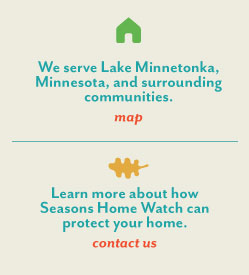Prep Your House for Snowbird Season
Posted on January 2, 2018
This article featuring Seasons Home Watch appeared in the January, 2018 issue of Kiplinger's Retirement Report!
As the temperature drops and months of cold weather loom ahead, snowbirds pack up for warmer climates, anticipating sunny days free of freezing ice, snow shoveling and other winter worries. But if you're not careful to prepare your home before you travel thousands of miles to your warmer destination, that escape won't be so carefree.
"You just don't know what can happen when you are away," says Jack Luber, executive director of the National Home Watch Association, which represents companies that perform scheduled inspections of unoccupied homes. "Water heaters and pipes can spring leaks, and the smallest leak that goes undiscovered can cause a flood. Sometimes it's just horrible."
Closing up your home involves everything from setting timers for inside lights to letting a trusted neighbor know how to reach you. Create a checklist, like the packing list you prepare for a trip. Include hands-on tasks such as replacing furnace filters and setting temperature controls. Decide what kind of high-tech monitoring would work best for you, and review your homeowner's insurance to be sure you are adequately covered. Consider hiring a home watch service. And try not to put everything off until the last minute.
Get Packing
Begin with the basics - simple things you can do yourself, says Luber. Ask a friendly neighbor to park his or her car in your driveway occasionally. Make sure timers turn lights on at different times, and in different parts of the house. "There are a lot of telltale signs when a house is empty," says Luber. "You don't want anything to give that impression."
For winterizing, use insulated covers for outside spigots. Install alarms inside to alert you if the temperature drops too low. Consider shutting off the water and draining the pipes. Also, pour a little olive oil into the garbage disposal so it won't rust. And empty and turn off the the ice maker in the freezer - it could leak if the power goes out, says Rebecca Anderson, co-owner of Seasons Home Watch, in Mound, Minn, a service that visits properties for absent homeowners. Read more tips on her blog at www.seasonshomewatch.com.
Check again with your insurance agent. If you're gone for just the seasonal months, your current policy likely will be fine. But for a longer absence you want to be sure you are adequately covered at both your primary and vacation residences, says Elaine Montgomery-Baisden, chief underwriting officer for personal insurance at Travelers. Coverage for unoccupied property varies by policy, and you may have to pay a surcharge for your unoccupied home. Tell your agent if you have someone housesitting or regularly checking on your house, because that could reduce your costs. Hire someone to clear snow from your sidewalks and driveway, to lessen the likelihood of someone falling and filing a claim, she says. (Get more tips at www.travelers.com/resources.)
Jo Moorman, 65, and her husband, Brice, 56, have a house near Scottsdale, Ariz., and a condo outside Minneapolis. When they leave the condo for a seven-month stay in Arizona, they "de-insure" an unused car left behind in Minnesota on their agent's advice, saving several hundred dollars, Jo says. Check with your insurer on how to safely pare back coverage temporarily.
The Moormans use the internet to monitor their homes with cameras, their smartphones and their computers. The couple even added space heaters that they can control remotely in their condo after they got a text in Arizona from their Minnesota alarm system that the condo temperature had fallen, which turned out to be the result of a furnace malfunction.
The couple also hired Anderson's home watch firm to inspect their home on a regular basis as an additional backup, Jo says. Anderson collects junk mail, runs hot water, flushes toilets and more. Priceis to hire a home watch firm depend on the size of a home and its location but generally run about $50 per visit, and services often offer visits once every two weeks or so. You can find a service at www.nationalhomewatchassociation.org.


